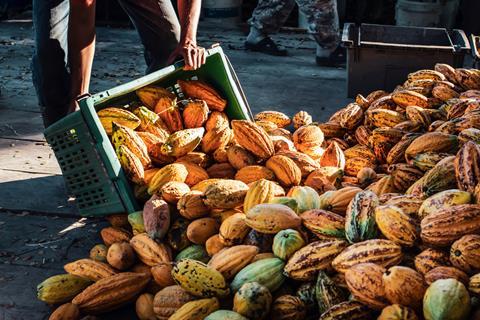
Our relationship with food is complex. On the one hand, it has the power to open spaces for celebration and contentment. At the same time, it can also contribute to division and degradation.
Having worked across the global foods industry in sourcing, buying, trading and setting up growing projects, I have seen the transformative role that food and its production can have on the livelihoods of global producers. But I have also witnessed the pressing challenges facing producers and their communities, which create insecurities and expose the fragility of our food systems.
In the UK, the case for more local production should be and remains an important ambition. However with approximately 46% of food consumed in the UK produced across the world, our access to food hinges on the security and livelihoods of global producers.
Food retailers and brands – who sit at the apex of many food value chains – need to be relentlessly ambitious and courageous in empowering and supporting the livelihoods of their producers. Social certifications and paying premium prices are important – however, with the mounting challenges facing producers, these mechanisms are arguably not enough.
Instead, retailers must work alongside their suppliers to seek out ways to ensure food producers retain better value from the food they grow. Imposing compliance onto suppliers to adhere to social and environmental standards should only ever be a starting point.
For instance, there is already evidence to suggest producer organisations are being excluded from supply contracts in the wake of recent EU directives, such as the deforestation-free regulation (EUDR) and corporate sustainability due diligence directive.
Some are seeing their supply contracts brought to a halt, as they currently cannot demonstrate to their European buyers that they can comply with EUDR. Whilst these directives were not designed and imposed by food retailers, it highlights the importance of collaboration across value chains when designing sustainability solutions, so that producers do not face the full burden of compliance.
The sector needs to create spaces where producer organisations, co-operatives and farmer groups can lead the decision-making on how we create more responsible supply chains. For this to happen, there are many structural barriers that need to be overcome, but such an approach would have the power to reimagine our food system away from being extractive towards being uplifting.
What would a future food system look like in which UK retailers champion global food producers? It would embrace a ‘producer first’ approach, whereby retailers work collaboratively with supply chain partners to ensure growers have long-term sourcing commitments. It would challenge the status quo by championing rural women and young people to mobilise their collective power and lead entrepreneurial solutions to development challenges.
Finally, notwithstanding the complexity of global foods system issues, retailers would be radical by seeking out and prioritising suppliers who pursue local value addition in relatively poorer agricultural regions. This would turn the current model on its head, in which low-value raw material is typically extracted from the global south then transformed into higher value-added products in more industrialised economies.
Sustainability can no longer be an appendage to business plans. It is the foundational building block for resilience. It should start with leading retailers and buyers asking themselves: who do I have around my table?
Yes, dinner with our usual friends is always worthwhile. However, we can run the risk of growing so familiar with the same flavours and ingredients that we miss out on the real transformation and resilience that can come from meaningfully collaborating with others with different lived experiences.



















No comments yet